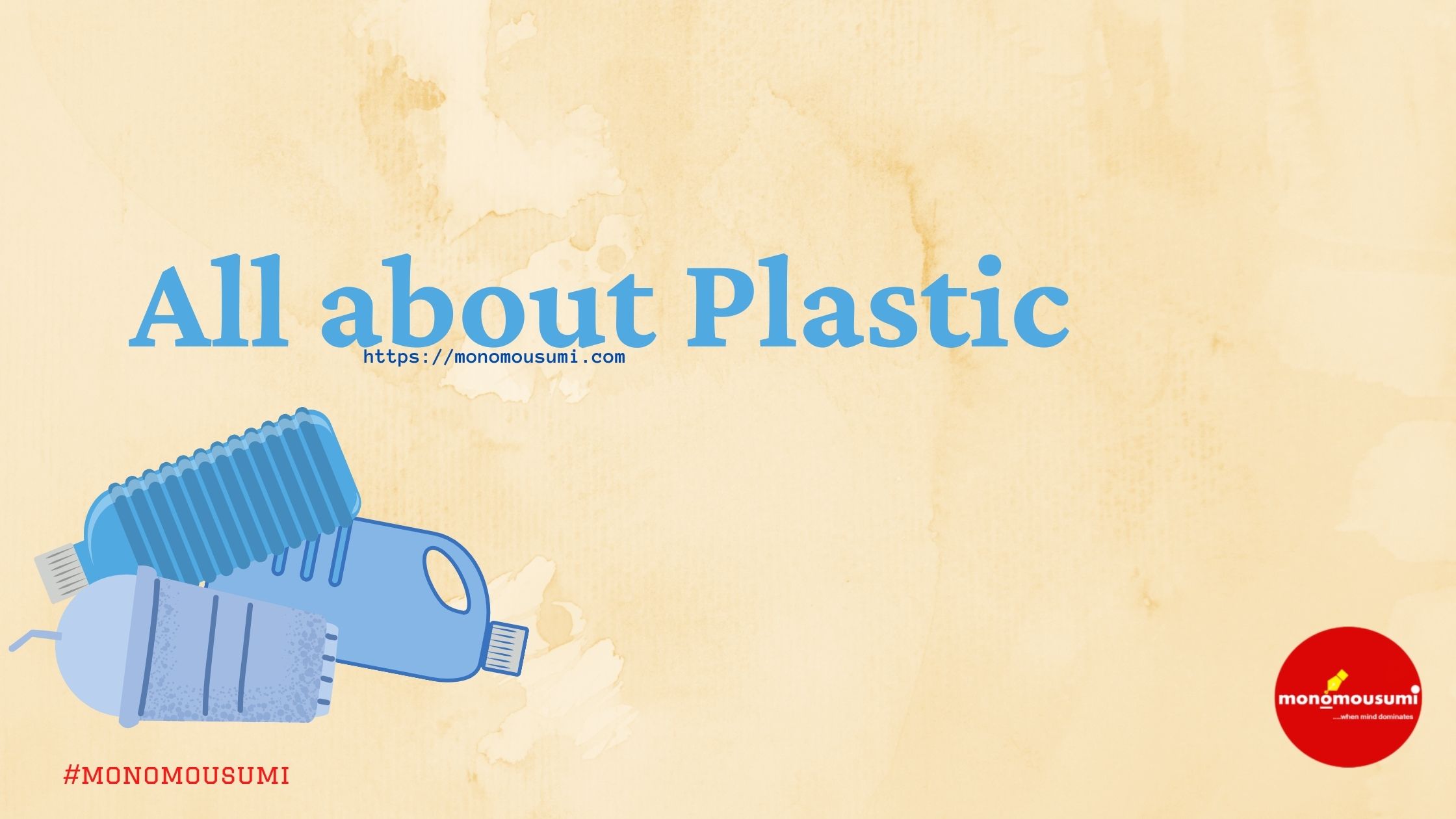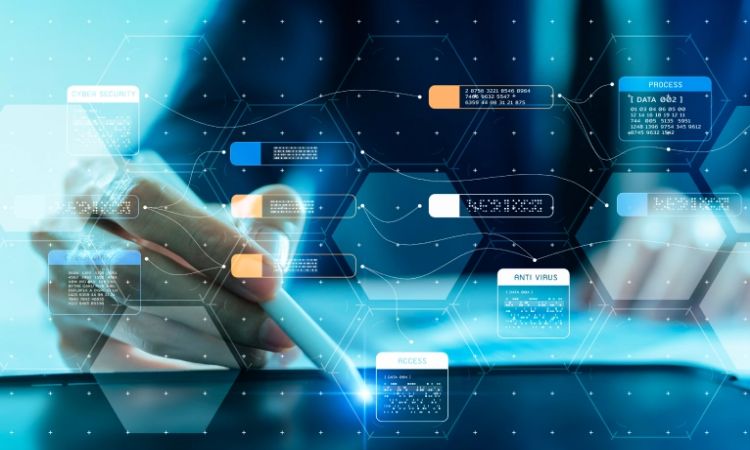
World without plastic is beyond imagination. If we want to give a name to this age then we might surely call it the ‘Plastic Age’. Plastic may be a word that originally meant pliable and simply shaped. Plastics are an honest range of synthetic or semisynthetic materials that sometimes use a polymers as a main ingredient. Bakelite was the world’s first fully synthetic plastic invented in Newyork in 1907 by Leo Baekeland. Most of the materials that are called plastic are organic polymers. The overwhelming majority of those polymers are formed from chains of carbon atoms, ‘pure’ or with the addition of oxygen, nitrogen or sulfur. Plastics are materials with strong, inexpensive, lightweight, durable, corrosion resistant with high thermal and electrical insulation properties. As a consequence, the assembly of plastics has increased substantially over the last 60 years.
Plastics clearly constitute a crucial component of the range of materials utilized in modern society. Most aspects of lifestyle involve plastics or rubber in some form or the another. Automotive applications and toy manufacture use smaller but significant volumes of plastics. Use of plastics within the developing world is increasing because the lower cost and enhancements in performance specifications continually promote its substitution for materials like paper metals, wood and glass. Over 40 million tonnes of plastics were converted into textile fibre worldwide to be used in apparel manufacture. Most footwear also relies heavily on plastics. Due to their light weight, plastics reduce transportation costs and, therefore atmospheric CO2 emissions. Public and private transportation vehicles can now contain up to onefifth plastics typically as parcel shelves, door liners, steering wheels, electrics, electronics and up so far aircrafts. Plastics also deliver many public health benefits. They facilitate clean beverage supplier and enable medical devices ranging through surgical and equipment, drips aseptic medical packaging that reduces food wastage and prolongs the lifetime of meat and vegetables. Meat are often kept in plastic packaging to stop potential diseases, while the utilization of plastic trays to stay food fresh has helped to diminish waste in stores. Plastics made possible the event of computers, cell phones, and most of the life saving advances of recent medicine. It’’s evident that plastics bring many societal benefits and offer future technological and medical advances. Plastics has made a profound impact on almost every industry it is touched.
Today, plastic is employed heavily in most fields together of the foremost reliable and versatile materials around. Perhaps most vital, inexpensive plastics raised the quality of living and made material abundance more readily available. But the consequences that ‘Plastic’ has made on a environment and human life socially and economically can’t be denied.
Plastic pollution is one among the growing problem on global level. Plastic products are getting used almost all industries since it’s effective and cheaper than the opposite materials. However, plastic became a special target because, while numerous plastic products are disposable, plastic lasts forever within the environment and causes pollution. It affects the planet in several ways. Also it’s contributing indirectly to the issues of worldwide warming and global climate change . Most vital effects of plastics pollution on environment are, ocean pollution, land pollution and food pollution. Oceans are becoming polluted by plastics and each year it’s getting worse than before. Annually plastic trash within the landfills are polluting the air, atmosphere, water, land and most importantly human health. Plastic debris, laced chemically and sometimes ingested by marine animals, can injure or poison wildlife. Land pollution due to plastics poses a threat to the plants and animals including humans who are dependent on the land. Microplastics entering the physical body can cause an array of health impacts which causes inflammation, genetoxicity, oxidative stress, apoptosis, necrosis including cancer, cardiovascular diseases and lots of more like this. Even social and economic life got affected due to plastic pollution. Plastic pollution costs $13 billion in economic damage to marine ecosystems per annum . This includes losses to the fishing industry and tourism, also due to the cost to wash up beaches.
In light of the growing concern about the nagative impacts of plastics on environmental and human health, campaigns by governments, NGOs, foundations and some social media groups try to warn people about all these problems. Some governments are enforcing strict rules to avoid using plastic products so people can understand that plastic waste affects not only the environment but human life as well. Some innovative techniques to reduce the amount of global plastic pollution focus on different life cycle stages of plastic, including production, consumption, and waste management which can involve landfilling, recycling or repurposing. During the recycling phase, innovative solutions, such as converting waste plastics into fuels by using different methods and reusing plastics are being explored. Now-a-days making usable things like footwear, decorative crafts from waste plastics, construction of walls using plastic bricks and many such kind of small innovations are the examples that offered as one of the solution for reducing plastic pollution. We should be more alert and need to be more careful while using and dumping plastic and plastic products. Every citizen needs to be equally contribute to tackle this global challenge. At the social level, plastic pollution can be reduced by simply small changes of the daily habits. Reducing plastic pollution therefore requires a concerted effort from all of us and with minor behavioural changes, we can all contribute to curb the current pollution trends and have a healthier environment.
So let’s pledge today to make our mother earth a beautiful heaven.
World without plastic is beyond imagination. If we want to give a name to this age then we might surely call it the ‘Plastic Age’. Plastic may be a word that originally meant pliable and simply shaped. Plastics are an honest range of synthetic or semisynthetic materials that sometimes use a polymers as a main ingredient. Bakelite was the world’s first fully synthetic plastic invented in Newyork in 1907 by Leo Baekeland. Most of the materials that are called plastic are organic polymers. The overwhelming majority of those polymers are formed from chains of carbon atoms, ‘pure’ or with the addition of oxygen, nitrogen or sulfur. Plastics are materials with strong, inexpensive, lightweight, durable, corrosion resistant with high thermal and electrical insulation properties. As a consequence, the assembly of plastics has increased substantially over the last 60 years.
Plastics clearly constitute a crucial component of the range of materials utilized in modern society. Most aspects of lifestyle involve plastics or rubber in some form or the another. Automotive applications and toy manufacture use smaller but significant volumes of plastics. Use of plastics within the developing world is increasing because the lower cost and enhancements in performance specifications continually promote its substitution for materials like paper metals, wood and glass. Over 40 million tonnes of plastics were converted into textile fibre worldwide to be used in apparel manufacture. Most footwear also relies heavily on plastics. Due to their light weight, plastics reduce transportation costs and, therefore atmospheric CO2 emissions. Public and private transportation vehicles can now contain up to onefifth plastics typically as parcel shelves, door liners, steering wheels, electrics, electronics and up so far aircrafts. Plastics also deliver many public health benefits. They facilitate clean beverage supplier and enable medical devices ranging through surgical and equipment, drips aseptic medical packaging that reduces food wastage and prolongs the lifetime of meat and vegetables. Meat are often kept in plastic packaging to stop potential diseases, while the utilization of plastic trays to stay food fresh has helped to diminish waste in stores. Plastics made possible the event of computers, cell phones, and most of the life saving advances of recent medicine. It’’s evident that plastics bring many societal benefits and offer future technological and medical advances. Plastics has made a profound impact on almost every industry it is touched.
Today, plastic is employed heavily in most fields together of the foremost reliable and versatile materials around. Perhaps most vital, inexpensive plastics raised the quality of living and made material abundance more readily available. But the consequences that ‘Plastic’ has made on a environment and human life socially and economically can’t be denied.
Plastic pollution is one among the growing problem on global level. Plastic products are getting used almost all industries since it’s effective and cheaper than the opposite materials. However, plastic became a special target because, while numerous plastic products are disposable, plastic lasts forever within the environment and causes pollution. It affects the planet in several ways. Also it’s contributing indirectly to the issues of worldwide warming and global climate change . Most vital effects of plastics pollution on environment are, ocean pollution, land pollution and food pollution. Oceans are becoming polluted by plastics and each year it’s getting worse than before. Annually plastic trash within the landfills are polluting the air, atmosphere, water, land and most importantly human health. Plastic debris, laced chemically and sometimes ingested by marine animals, can injure or poison wildlife. Land pollution due to plastics poses a threat to the plants and animals including humans who are dependent on the land. Microplastics entering the physical body can cause an array of health impacts which causes inflammation, genetoxicity, oxidative stress, apoptosis, necrosis including cancer, cardiovascular diseases and lots of more like this. Even social and economic life got affected due to plastic pollution. Plastic pollution costs $13 billion in economic damage to marine ecosystems per annum . This includes losses to the fishing industry and tourism, also due to the cost to wash up beaches.
In light of the growing concern about the nagative impacts of plastics on environmental and human health, campaigns by governments, NGOs, foundations and some social media groups try to warn people about all these problems. Some governments are enforcing strict rules to avoid using plastic products so people can understand that plastic waste affects not only the environment but human life as well. Some innovative techniques to reduce the amount of global plastic pollution focus on different life cycle stages of plastic, including production, consumption, and waste management which can involve landfilling, recycling or repurposing. During the recycling phase, innovative solutions, such as converting waste plastics into fuels by using different methods and reusing plastics are being explored. Now-a-days making usable things like footwear, decorative crafts from waste plastics, construction of walls using plastic bricks and many such kind of small innovations are the examples that offered as one of the solution for reducing plastic pollution. We should be more alert and need to be more careful while using and dumping plastic and plastic products. Every citizen needs to be equally contribute to tackle this global challenge. At the social level, plastic pollution can be reduced by simply small changes of the daily habits. Reducing plastic pollution therefore requires a concerted effort from all of us and with minor behavioural changes, we can all contribute to curb the current pollution trends and have a healthier environment.
So let’s pledge today to make our mother earth a beautiful heaven.
By Ankita Omkar Swami, Pune


